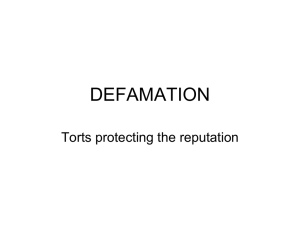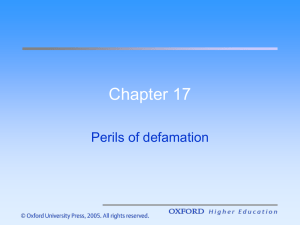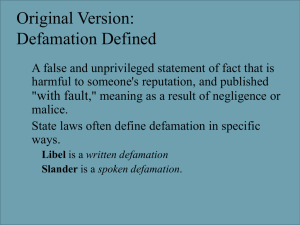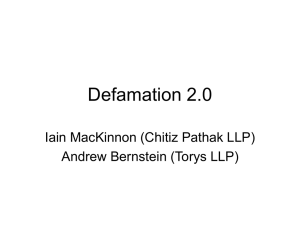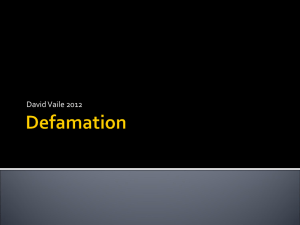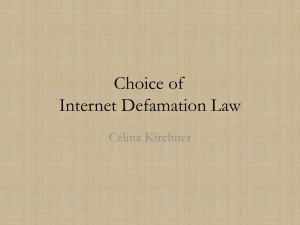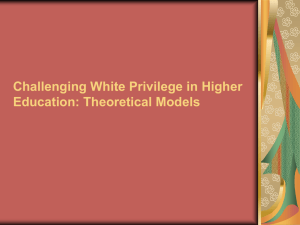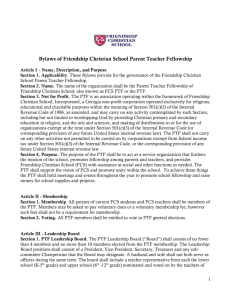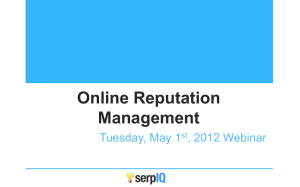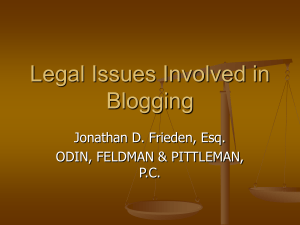DEFAMATION
advertisement
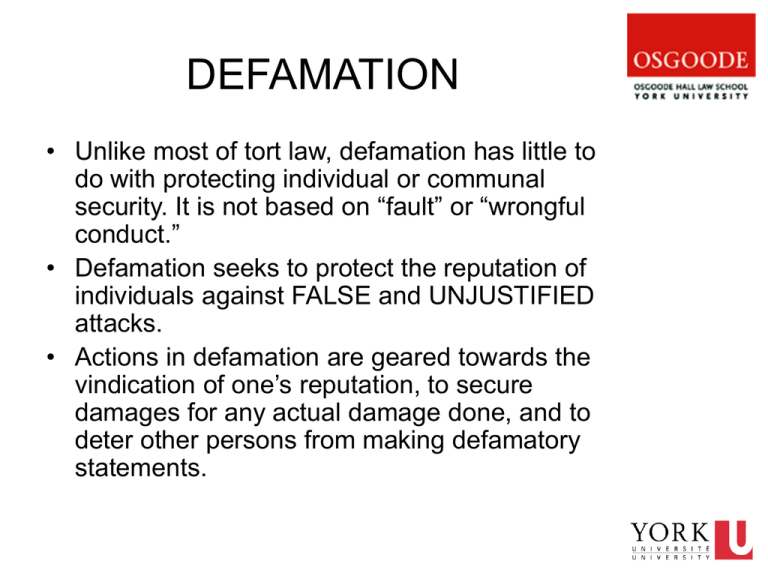
DEFAMATION • Unlike most of tort law, defamation has little to do with protecting individual or communal security. It is not based on “fault” or “wrongful conduct.” • Defamation seeks to protect the reputation of individuals against FALSE and UNJUSTIFIED attacks. • Actions in defamation are geared towards the vindication of one’s reputation, to secure damages for any actual damage done, and to deter other persons from making defamatory statements. Origins of Defamation Law • Historically, all societies have frowned on those who make false allegations against other members of society. • The Quran, Bible, Talmud, and other ancient religious texts all forbid making false allegations. • Ancient Romanic and Teutonic laws all forbade slanderous words and punished those who made them. Origins of Defamation Law • The modern law of libel arose from the Case de libellis Famosis of 1605 where the Archbishop of Canterbury was alleged to have been traduced and scandalized by an anonymous person. • It was in 1670 that tort law made a distinction between libel and slander. Libel and Slander • Libel refers to false and disparaging remarks published through printing by way of signs, pictures, writing, films, statues, films. It is actionable per se, even without proof of damage. see Libel and Slander Act of Ontario. • Slander refers to oral pronouncements that are false and disparaging. It is only actionable on proof of damage which must be pleaded and proved. There are however, four classes of slanderous statements that are actionable per se. Actionable Slander • Imputation of the commission of a serious crime punishable by a prison term; • Imputation of a loathsome disease, eg. VD; • Imputation of “Unchastity” to a woman (this did not apply to a man) • Imputation of unfitness to practice one’s trade or profession. Defamation and Free speech • There is a debate as to whether, in a democratic society, the state should regulate what individuals say or publish about other persons. • In Canada (unlike the USA) tort law has largely deferred to the preservation of individual reputations, even if such stance results in a diminished exercise of the right to free speech. What is Defamatory? • There is no universal test for judging whether the words or utterance in issue is defamatory of a ptf. • The usual test, however, is “whether the words complained of are calculated to injure the reputation of another by exposing him/her to hatred, contempt or ridicule.” What is Defamatory? • Another test is whether the words complained of “lowers a person in the estimation of right-thinking members of society generally.” In other words, an utterance is defamatory if it makes familiar with the person to think less of him/her. • The standard is that of ordinary, rightthink members of society. Objective or Subjective test? • Jurists insist that the standard is an objective one, and the yardstick is that of thoughtful, informed and balanced persons. • However, it would appear that the test is sometimes not as robustly “objective” as jurists have espoused in several cases. It seems that objectivity is sometimes modified to suit the context in which the words were uttered and with regard to prevailing notions of what type of utterances lower a person’s reputation, or tarnish his/her image or expose him/her to ridicule, shame, or pity. Examples of Defamation • Elizabeth French v. Smith [1923] 3 D.L.R. 904“…five fellows took Elizabeth behind the church and screwed her.” • Penton v. Caldwell, “he is a liar.” • Pandolfo’s case, “he is a crook” • Grassi’s case, “he is a child molester” • Berkoff’s case, “he is hideously ugly.” Social Changes and Defamatory words • It is arguable that words which were hitherto considered defamatory may with passage of time lose their defamatory sting. For example, in • Nowark v. Savage, and Buck v. Savage, ptfs were respectively called homosexuals. Dfts were held liable. With increasing acceptance of homosexuality as a legitimate expression of human sexuality, courts may have to (re)examine social attitudes before finding liability. Social Changes and Defamatory Words • Similarly, it is doubtful whether a description of someone as a communist held to be defamatory in Dennison v. Sanderson, would have the same meaning in current times. • Again, to call someone a “wife-swapper” (Hunter’s case), may not be defamatory in country’s or provinces where wife-swapping is an acceptable social practice devoid of negative moral judgments. The Essence of Defamation • The core objective of the law of defamation is to protect individual reputation. As the SC noted in Hill . Church of Scientology, “a good reputation is closely related to the innate worthiness and dignity of the individual. False allegations can so very quickly and completely destroy a good reputation. A reputation tarnished by libel can seldom regain its former lustre.” Victims of Defamation • Only the living can be defamed. The dead have no justiciable reputation, unless the imputation made to them reflects on the living. For e.g, to say that the deceased could not have been the natural father of his living children may defame her family because their social status is impugned. Slander and Professionals • Reputation is especially vital for professionals. Therefore, words which disparage a person’s professional capacity may amount to defamation. For example, to call a doctor a “quack” (Warren v. Green),or a lawyer a “shyster” (Nolan’s case), were respectively held to be defamatory. • In the same vein, a professional musician of whom it was said that he had “no aptitude for music” or an accountant of whom it was said that he had “no understanding of accounts” were respectively held to have been defamed. Making a case in Defamation • Plaintiff must prove the following: • That the material complained of was defamatory • That the material referred to him/her (the plaintiff); • That the material was published. Test for Defamatory Words • The usual standard of measurement in defamation is said to be that of “right-thinking members of society generally.” • The words “right-thinking” is ill-defined and could yield unjust or absurd results. The test for defamation is not based on polls; it is often based on what the relevant segment of society thinks of the ptf, provided, that relevant segment of society is not anti-social. • For e.g, to say that a mafioso is not a “mademan” may diminish his standing among his fellow criminals without being actionable. Murphy v. Lamarsh Dft published of the ptf (Murphy): ‘a brash young radio reporter, Ed Murphy (heartily detested by most of the press gallery and the members)…,” These words were alleged by ptf to be libelous. In the opinion of the court, the ordinary reader of the comments would think that “there must be something wrong or bad about this man Murphy to make these people detest him.” Therefore, the words were held to be defamatory of Mr. Murphy. INTERPRETATION • The first rule is that words must be given their ordinary and natural meaning. • Natural and ordinary meaning of words includes any inferences or implications which they may reasonably bear. The meaning intended by the publisher is irrelevant. • Natural and ordinary meaning may implicate peculiar activity of the ptf. For e.g, to say that a kosher butcher sold bacon was held to be defamatory. INTERPRETATION • Natural and ordinary meanings of words may implicate the locale or context in which the words were uttered. For e.g. to call a white man a “coloured gentleman” (although the newspaper retracted the publication and declared him to be of “the purest Caucasian race”) was held to be defamatory in Louisiana. INTERPRETATION • There need not be a direct assault on the reputation of ptf. • Courts have to look at the overall context, the prominence or lack thereof given to the offending works. • In slander, courts would also look at the tone of voice, body language, etc to determine whether the words are libelous. INTERPRETATION • Ultimately, the court must determine, as a question of law, whether the words, gestures, etc, in the context in which they were uttered or published are capable of bearing a defamatory meaning. INNUENDO • Words may appear harmless on the surface but in narrower contexts in which special knowledge is possessed by certain people, be defamatory. • There are two categories of innuendoes. The first refers to words with technical meaning which depends on some special knowledge possessed by a limited number of persons only. INNUENDO • The second category refers to words which may on certain occasions bear some special meaning other than their natural meaning because of some extrinsic facts of circumstances. • A ptf must plead and prove a legal innuendo and the underlying facts which make the words have a special meaning. Material Must refer to Ptf • In addition to the material being defamatory, ptf must prove that the words were spoken of and concerned him/her. This is often known as the “colloquium”. • There is little problem when the ptf is specifically named in the offending material. The Colloquium • The challenge is when the ptf has to be identified by inference. The law is that ptf must show that a reasonable reader would identify the material as referring to the ptf. • Identifying the ptf is problematic when s/he is part of a group. To say that “all lawyers are thieves” is obviously an exaggeration which cannot ground an action in libel. Mass Defamation • However, where the group is a relatively small one, members may recover. The courts have not sufficiently delineated “small” groups from ‘large’ one. • In Booth v. B.C.T.V, a prostitute interviewed by the TV stated that 2 members of the Narc Squad “that are high up, right up on top” took payoff. 11 members of the Vancouver Police Dept., sued. The court found for the 2 top officers but dismissed the action of the other 9 because the defamatory comments could not be said to have referred to them. Hate Propaganda • Owing to the inadequacies of defamation in protecting minority groups, legislation has been enacted to offer protection to victims of “hate propaganda.” • s.319 of the CC, “every one, who by communicating statements in any public places, incites hatred against any identifiable group [distinguished by colour, race, religion, or ethnic origin] where such incitement is likely to lead to a breach of the peace” or Hate Propaganda • Every one who, by communicating statements, other than in private conversation, willfully promotes hatred against any identifiable group is guilty of an offence.” • Questions and numerous litigations have arisen as to whether such laws limit the right to free speech in a democratic society. See the Zundel cases. Publication of Material • The test requirement is that the material must be published. Publication means communication to a third person. • If words have been used, ptf must prove that other persons heard and understood the offending words. • If, however, publications was never intended, and the dft could not by reasonable care have avoided it, there would be no liability. Some element of fault is required. Apology • Given the important role that “fault” plays in attaching liability, especially in cases of accidental publication of defamatory material, an apology by the dft is accorded serious weight. • Many jurisdictions have enacted laws empowering the courts to take apologies into consideration in determining quantum of damages. Defences • Truth is an absolute defence to defamation. No one is entitled to a reputation s/he does not possess. • Dft must not only prove the truth of the material in their ordinary and natural meaning but also in their inferential and innuendo meanings. • It is the substance of the truth, not its minute details that matter. Absolute Privilege • Judges, witnesses, advocates, and parties to a litigation may speak freely and falsely while participating in judicial proceedings. • Court documents, proceedings, and client/lawyer communications pertaining to a suit are equally immune. • Reports of judicial proceedings are also protected, provided they are fair and accurate, published contemporaneously with such proceedings, and where necessary, must contain a reasonable statement of explanation by the ptf. Absolute Privilege • Statements made on the floor of Parliament, communications made between Ministers of the Crown, and communications between very senior members of the military are also protected. Qualified Privilege • This is conditional immunity that attaches to certain occasions below the ambit of absolute privilege. It attaches to the occasion upon which the communication is made, and not to the communication itself. • It arises “where the person who makes the communication has an interest or a duty, legal social, or moral to make it to the person to whom it is made, and the person to whom it is made has a corresponding interest of duty to receive it.” Whether the occasion is privileged is a matter of law. Qualified Privilege • Only statements which are relevant to the privileged communication are protected. For the defence to hold, there must be no malice on the part of the dft and the privilege must not be exceeded. • Qualified privilege arises where in cases of (1) public interest, or (2) moral or legal interest to protect another’s interest, or (3) common interest or mutual concern, (4) protection of one’s own interest. Self-Protection • A person is at liberty to rebut wrongful imputations made against his/her reputation. The response must be limited to words necessary to “put the records straight.” • The defence cannot be used to destroy another person’s reputation. The refutation must be addressed to those with a duty to receive it. Mutual Concern • On a subject in which parties have a mutual legitimate interest, (business or pecuniary) communication between parties enjoy qualified privilege. Shareholders and directors may, in the absence of malice, exchange information about employees without attracting tort liability. Jones v. Campbell • Burnley “Rocky” Jones, a famous Black lawyer was sued by Constable Campbell for comments he made at a public press conference in respect of a pending litigation. • Campbell had been invited by the principal of a predominantly Black school in Halifax to investigate two incidents of theft at the school. In her investigations, Campbell strip searched three Black female students in the predominantly Black school located in a poor neighbourhood. Following public outrage, the girl’s parents sued Campbell and the police. Jones v. Campbell • At a press conference called by Rocky Jones, the media asked Jones questions and in response, he said that in his view, Campbell would not have strip searched the girls if they were White girls or girls from affluent families. • Campbell sued in defamation alleging that Jones’ comments and written speech suggested that she was a racist. The trial court found for her on the basis that the press conference went beyond the needs of qualified privilege. Jones appealed to the NS CA. Jones v. Campbell • In a split decision, the CA held that for qualified privilege to apply, the dft must communicate appropriate information to the appropriate people. Qualified privilege does not fail simply because the dft addressed the public at large. As long as there is reciprocity between the informer and the informed, and the statements were germane and appropriate, and there is no malice on the part of the dft, the defence of qualified privilege will apply. Moral or legal duty to protect the interest of another • A person who makes a statement in the discharge of a public or private duty, whether legal, moral, or social enjoys qualified privilege. The recipient of the information must have a reciprocal interest in receiving. • This defence usually applies when parties are responding to specific inquiries, for e.g, character references on discharged employees or defamatory statements made by a father to his daughter about a prospective husband. Watt v. Longsdon • Ptf sued the dft for sending his wife, who was in England, a letter which indicated that he had had “immoral relations” with his housemaid while living in Morocco. The ptf’s wife sued him in divorce as a result. Dft, a friend of the wife, had done business with ptf in Morocco. Dft pleaded in defence that he was under a moral duty to inform ptf’s wife of the alleged affair in Morocco. The CA in England held that there was no moral or social duty to make such communication. Public Interest • Comments made by publishers to the public on a matter of public interest may be immune from liability. The success of this defence, especially when used by politicians, is mixed. • The bone of contention has been the role of the media, particularly the print media in communicating information to the public. • The law in Canada is that the media has the same right as any other person to report truthfully and comment fairly upon matters of public interest. See the Globe and Mail v. Boland; Banks v. Globe and Mail. Public Interest • However, there have been some statutory protections for the media, on the conditions that their reports are: • fair and accurate; • devoid of malice; • concern the proceedings of Parliament; • Not blasphemous, seditious, or indecent; • and concern matters of public interest. See Hill v. Church of Scientology Hill v. Church of Scientology • The SC expanded the ambit of qualified privilege to include court documents which have not yet been filed but were proposed to be filed. The defence was defeated, however, because the dft exceeded the bounds of the privilege. • Note that actual court documents are covered by absolute privilege but the reporting and republishing of those same documents outside the court is protected only by qualified privilege which may be defeated by malice, or excess of privilege. Excess of Privilege • There is an excess of privilege where the dft used words which were not relevant to the discussion or if s/he communicated the material to those who are not entitled to receive it. • Unless the publisher has a qualified privilege to publish the material to the public, publication to the “world at large” would amount to an excess of privilege. Malice • Malice refers to ill-will, bad faith or spite. It can also mean the absence of honest belief in the material published. faith is a question of fact whether the dft was actuated by malice. • Malice goes to the state of mind of the dft at the time the offending words were published. • The onus is on the ptf to prove malice. Fair Comment • Persons may comment on matters of public interest, even if their comments are defamatory of other persons, if certain conditions are met. • As with other aspects of defamation law, the Canadian approach has been quite conservative. • The conditions for fair comments are stringent. Conditions for Fair Comment • The comment must be on matter of public interest; • The comment must be based on fact; • The comment must be recognizable as comment; • “Could any man/woman honestly express that opinion on the proved facts?” • In addition, there should be no malice.
